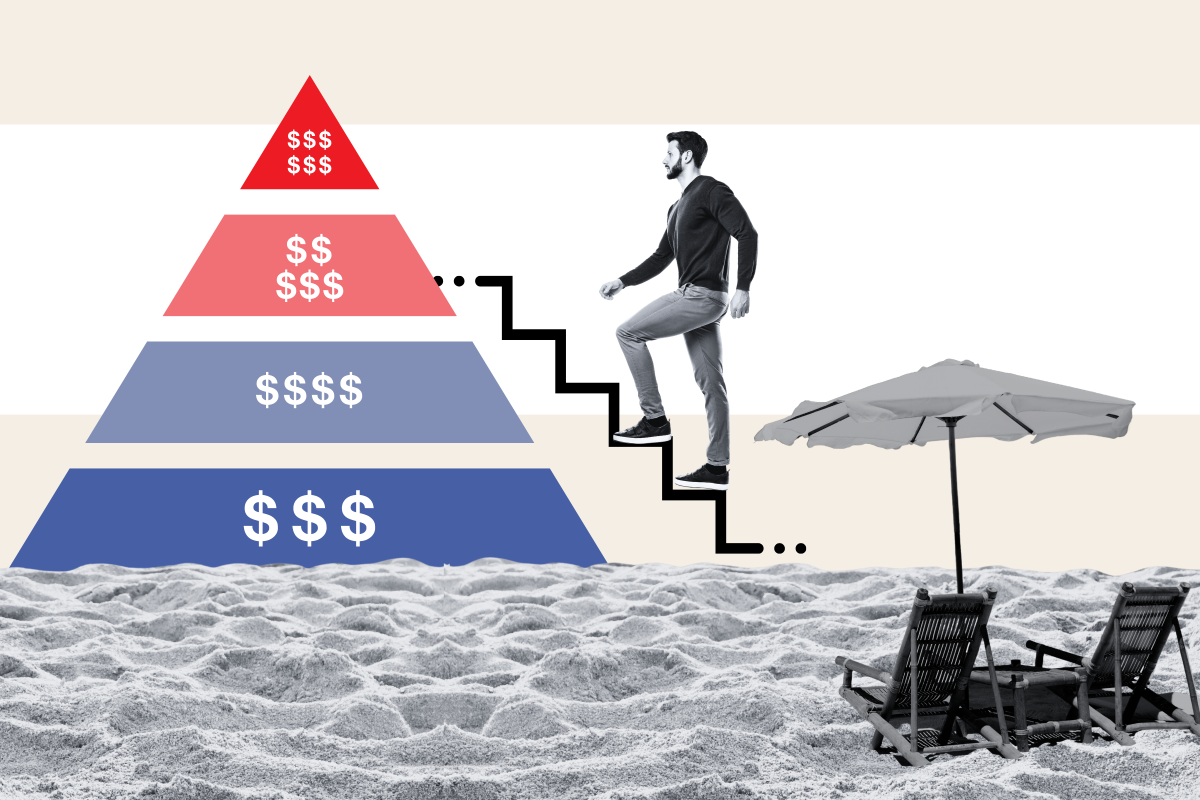What your vacation says about your social class

[ad_1]
In the 1970s, Pan Am promised it would be “America’s airline to the world,” whisking travelers away to exotic and glamorous destinations across the globe. Now, Pan Am is no more—and the dream of international travel also appears to be a distant one for many Americans.
In fact, more than half believe that taking a foreign vacation each year makes you upper class, according to polling conducted exclusively for Newsweek.
The survey by Redfield & Wilton Strategies found that 58 percent of adults believe those who take a foreign vacation once a year are a part of the upper classes. All current generations—Silent, Baby Boomers, Gen X, Millennials, and Gen Z—living across the U.S. agreed that taking a once yearly vacation abroad is within reach of only the wealthiest.
This is despite dramatic falls in the cost of international travel. In 1970, during Pan Am’s heyday, a return flight from New York to London cost around $550, according to research by Simple Flying, the equivalent of around $4,500 today. Now it’s possible to get a ticket for as little as $300. However, other costs, such as housing, have far outstripped inflation in the same period.
Ultimately, travel industry experts told Newsweek, foreign travel is seen by many Americans as a luxury they can ill afford, particularly given the huge range of destinations on offer at home.
Jasmin Diaz, chief marketing officer at at SmokyMountains.com, a vacations rental company, said international travel has long been “associated with wealth and social status” due to the “little freedom and money” provided by a 9-to-5 lifestyle.
“Flights are not cheap, as with accommodation, and you can’t just go to Europe for a day. You at least have to stay for a week,” she told Newsweek.
“Also, some people don’t leave their country their whole lifetime, sometimes because they choose not to, but other times because they financially can’t afford to do so.”
According to the results, those in Gen X—those born between 1965 and 1980—were most likely to see foreign vacations as a luxury of the upper classes, with 65 percent agreeing when asked: “In what class would you place someone who goes on a foreign vacation once a year?” The group that agreed least was Gen Z, at 50 percent.
During the first part of this century, foreign vacations among Americans were actually highest during the international financial crash, with the number of Americans taking a trip abroad—excluding Canada and Mexico—peaking at 31 million in 2008, according to data compiled by Statista.
However, foreign trips became more common in the latter part of the 2010s, peaking at 44 million Americans travelling abroad in 2019, right before the coronavirus pandemic all but halted international travel in early 2020.
Christopher Flavey, who runs Unique NOLA Tours in New Orleans, said that the attitude toward taking trips abroad was a uniquely American way of thinking.
“I believe a lot of the attitude towards foreign travel being just for the rich is a very American idea,” he told Newsweek. “Americans travel much more within the expansive United States, and indeed travelling to other countries is more rare.
“However, when it comes to Europeans and especially, say, Australians, travel across the globe beyond the home country is much more common for every class of person. And these trips happen yearly for even people without a large travel budget.”

For Gen Z, who agreed least with the statement that a foreign holiday is upper class, taking trips abroad is seen as more of a priority, according to Shiela Walsh, principal at Walsh Wealth and Wellness.
“Gen Z do not want to miss out on experiences and convenience, and can see them as must haves. They will spend money on vacations, Ubers and food delivery,” she told Newsweek.
“Even if they don’t like the feelings that come with spending their money, many Gen Zers feel some expenses are simply unavoidable.”
The results for domestic holidays were strikingly different. Less than half of Americans believe taking more than one holiday within the U.S. per year is an upper class thing to do, with most (52 percent) agreeing multiple domestic trips is a mainstay of the middle classes, according to the poll, which was conducted on February 18 among 1,500 eligible U.S. voters.
Gen Z is more likely to consider several yearly trips a luxury of the upper classes, at 41 percent, compared with 30 percent of those born before 1965. Opinions on whether numerous domestic trips is a marker of being upper class lessened with each generation, at 36 percent of Millennials and 35 percent of Gen X.
Uncommon Knowledge
Newsweek is committed to challenging conventional wisdom and finding connections in the search for common ground.
Newsweek is committed to challenging conventional wisdom and finding connections in the search for common ground.
[ad_2]